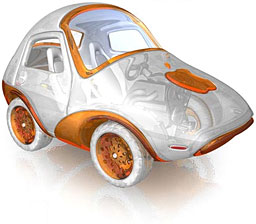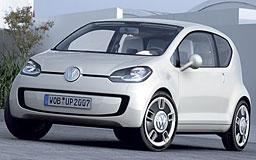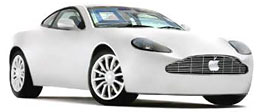As a lifelong car nut, I have a weakness for automotive analogies.
The Mac has often being called "the BMW or
computers" or "the Porsche of
computers" - and sometimes
"the Volvo of computers", the latter more in reference to the
perceived political preferences and and aesthetic tastes of Apple users
being weighted disproportionately toward urban, college-educated
liberals.
Apple and Volvo both rate mention on Christian Lander's hilarious
Stuff White People Like
blogsite, Apple getting a whole
dedicated article.
I hasten to add that the reference to "White People" is probably not
what you're thinking, rather a gentle but devastatingly witty send-up
of the foibles, follies, and fatuousness of (mostly) white,
well-educated (so to speak) urban liberals by a Canadian living in Los
Angeles. As The Atlantic Monthly's Benjamin Schwartz notes,
Lander's "White People aren't always white, and the vast majority of
whites aren't White People."
How About Volkswagen?
However, it occurred to me this week, while reading a syndicated
review of the new Volkswagen
Tiguan crossover/SUV, that Apple might more accurately be called
"the
Volkswagen of computers".
The article's author, G. Charles Williams, notes that VW has priced
the Tiguan substantially higher than its vehicle class competition,
between $23,000 and $32,000 as opposed to, for example, the Toyota RAV4
($,20,500 to $28,000) and the Mitsubishi Outlander ($20,000 to
$25,200), and that "Volkswagen says the extra cost of the Tiguan over
its competitors is justified because it's intended to be more rugged
and durable, and to offer a more
exciting driving experience, one of the hallmarks of VW
vehicles."
That sort of rationalization of pegging prices higher than the
competition has a familiar ring to it!
"However, the downside for VW putting these extra - cost 'qualities'
in Volkswagen vehicles, then setting their prices well above the
competition," Williams observes, "is a policy that has turned VW into a
niche marketer in the United States."
Arguably, it's a strategy that has worked out rather better for
Apple than Volkswagen, but Williams' point is valid, and it's
questionable how much further above the 10% market share threshold
Apple can rise - or in this economy whether they can't even sustain 10%
- while keeping its prices well above those of the PC competition.
There are, of course, other interesting VW-Apple parallels. For
example, both companies started out with a much more proletarian market
focus than they respectively evolved into. Volkswagen translated
literally means "people's
car", and Apple's early days slogan was "the computer for the rest
of us," although it didn't specify what demographic "the rest of us"
was referring to.
The iCar
Another Apple/VW connection is that in 2007 Steve Jobs met in
California with Volkswagen AG CEO Martin Winterkorn to discus an
alliance to produce an Apple-branded
(or at least themed) "iCar" automobile to be built by Volkswagen
with close integration of the iPod, iPhone, and other Apple products. A
VW spokesman told the news agencies at the time that "scores of ideas"
were tossed around, and the CEOs planned to hold more meetings. (The
images accompanying this article are concepts of what an iCar might
have been.)
 Of course, VW and many other car makers already offer
in-car connections for the iPod, but an integrated design would take
the technology to another level.
Of course, VW and many other car makers already offer
in-car connections for the iPod, but an integrated design would take
the technology to another level.
Sounds cool, but it was a concept fraught with difficult obstacles.
A report at the time by California-bases market research firm iSuppli Corporation notes: "While there
appears to be strong consumer desire for an iCar, the potential
Apple/Volkswagen collaboration faces a set of daunting challenges, and
is not likely to yield an actual automobile for three or four years,
iSuppli Corp. believes."
 If ever at all. Sadly, a few weeks later the German magazine
Capital reported that discussions between Apple and Volkswagen
had failed to result in a joint product-development deal and were
over.
If ever at all. Sadly, a few weeks later the German magazine
Capital reported that discussions between Apple and Volkswagen
had failed to result in a joint product-development deal and were
over.
The advantages for Apple would be extension of the iPod (and
subsequently iPhone) ecosystem into the automotive orbit, while for
Volkswagen the iCar had presumer potential to be an iconic hot seller.
As iSuppli noted, just the rumors of an iCar generated significant
cachet for Volkswagen - so it isn't hard to imagine the amount of
interest that would be catalyzed by an actual iCar product
introduction.
On the other hand, contradicting my Apple/VW parallels theory,
iSuppli argued that a major challenge to the success of a potential
Apple/Volkswagen iCar collaboration would be the vastly different
cultures of the two corporations.
 "Although the old cliché says 'opposites attract,'
the cultural divide between Apple and Volkswagen may be too wide to
bridge," said Richard Robinson, principal analyst, automotive
electronics, for iSuppli.
"Although the old cliché says 'opposites attract,'
the cultural divide between Apple and Volkswagen may be too wide to
bridge," said Richard Robinson, principal analyst, automotive
electronics, for iSuppli.
"Apple is a highly innovative and dynamic consumer electronics
company that generates significant profits from living off its wits and
supplying niche markets with the next big thing in music players,
mobile phones and personal computers. VW, on the other hand, is from an
entirely different tradition: the more conservative world of
automotive, with its solid four- to five-year development cycles, tight
margins and production-standard compliance requirements that would
bring even the most enthusiastic designer from Cupertino to his
knees."
"Thus, vehicle manufacturers are not interested in the next big
thing and instead are focused on producing solid, tried and tested
products that will be reliable for years," Robinson noted. "While
consumer-electronics warranty returns might eat into a company's
profits, automotive recalls are the stuff of nightmares in a car
industry that operates at the very margins of profitability."
"If your iPod fails, it's your problem, and you must shell out a
meager $120 to buy a new one - which is okay because you probably
wanted to get the latest model anyway," Robinson observed. "However, if
your two-year-old car's built-in infotainment system fails while
driving in 20-below temperatures on an Alaskan highway, it's not your
problem - it's a problem for the company that sold you the car and it
must bankroll the repairs. Automakers must bear this responsibility
throughout a car's entire warranty period, which typically lasts three
to five years....
"While Volkswagen would expect a car [it manufactured] to be
perfectly serviceable 10 year later, does anyone seriously think the
current iPod and iPhone ranges will be anything more than museum relics
a decade from now?" Robinson observed.
"This wide variation in business philosophies and dynamics could
have major negative repercussions for the iCar," iSuppli concluded.
The VW of Computers
Touché on that point, but I still think Apple could be the
Volkswagen of computers within the limitations of a necessarily inexact
analogy, or if you prefer, "the Audi, Bentley, Lamborghini or Bugatti
of computers" (all Volkswagen brands) if you prefer 0 and for that
matter, Porsche recently tool a controlling interest in the VW
empire.
And on the other side of the branding crossover equation, a Bentley,
Bugatti, or Porsche-themed MacBook Pro in the motif of the very
successful Acer Ferrari and Asus Lamborghini PC laptops would be
über-cool.
One can always dream, and it still may be a realistic dream from a
marketing perspective. Last week a report
by Reuters' Bob Burgdorfer noted that according to a Ford Motor Co.
study, the 16-to-31 age cohort will constitute the largest class of
drivers in the United States by 2010, which is one reason automakers
are loading their products with an eclectic array of electronic
plug-ins and ports, hoping to stimulate sales and improve the long-term
viability of their struggling industry.
When boomers like myself, now in our 50s and 60s, bought our first
wheels back in the 1960s and 1970s, we were interested horsepower, wide
tires, and dual exhausts, but the so-called Millennial Generation -
people born between 1982 and 2000, which includes my kids - is more
interested in music and entertainment technology, which would make an
Apple iCar a promising enterprise.

 Of course, VW and many other car makers already offer
in-car connections for the iPod, but an integrated design would take
the technology to another level.
Of course, VW and many other car makers already offer
in-car connections for the iPod, but an integrated design would take
the technology to another level. If ever at all. Sadly, a few weeks later the German magazine
Capital reported that discussions between Apple and Volkswagen
had failed to result in a joint product-development deal and were
over.
If ever at all. Sadly, a few weeks later the German magazine
Capital reported that discussions between Apple and Volkswagen
had failed to result in a joint product-development deal and were
over. "Although the old cliché says 'opposites attract,'
the cultural divide between Apple and Volkswagen may be too wide to
bridge," said Richard Robinson, principal analyst, automotive
electronics, for iSuppli.
"Although the old cliché says 'opposites attract,'
the cultural divide between Apple and Volkswagen may be too wide to
bridge," said Richard Robinson, principal analyst, automotive
electronics, for iSuppli.
